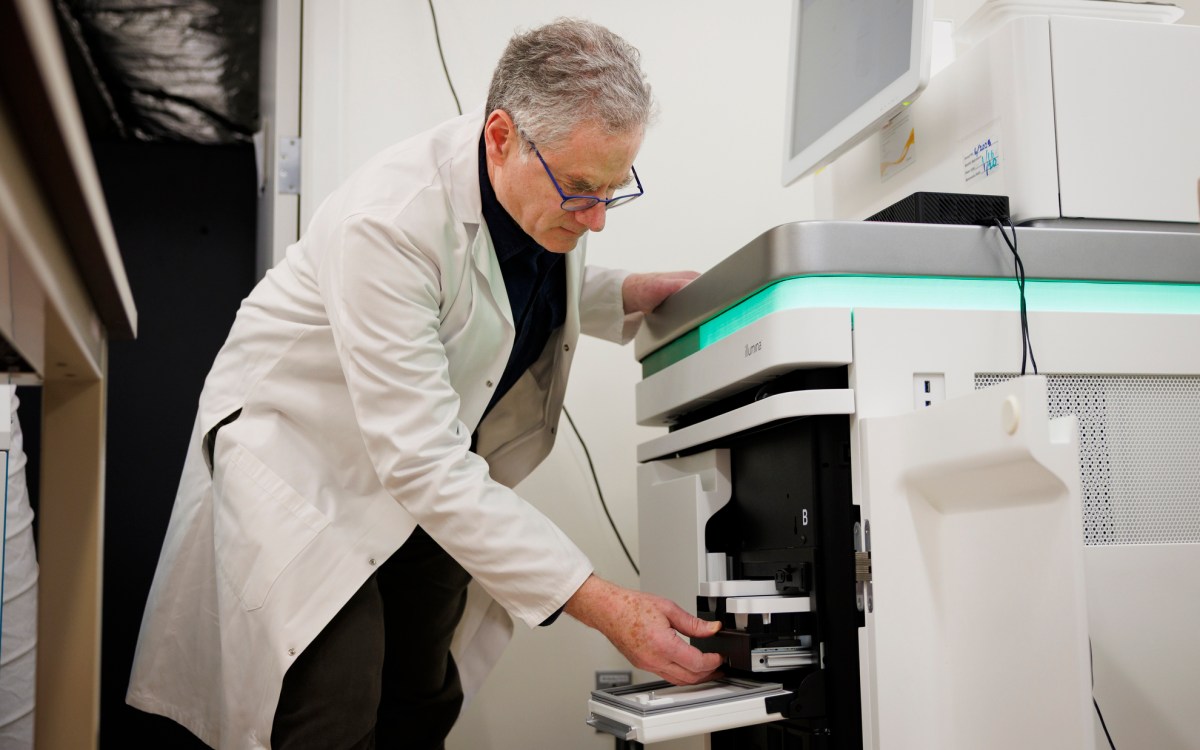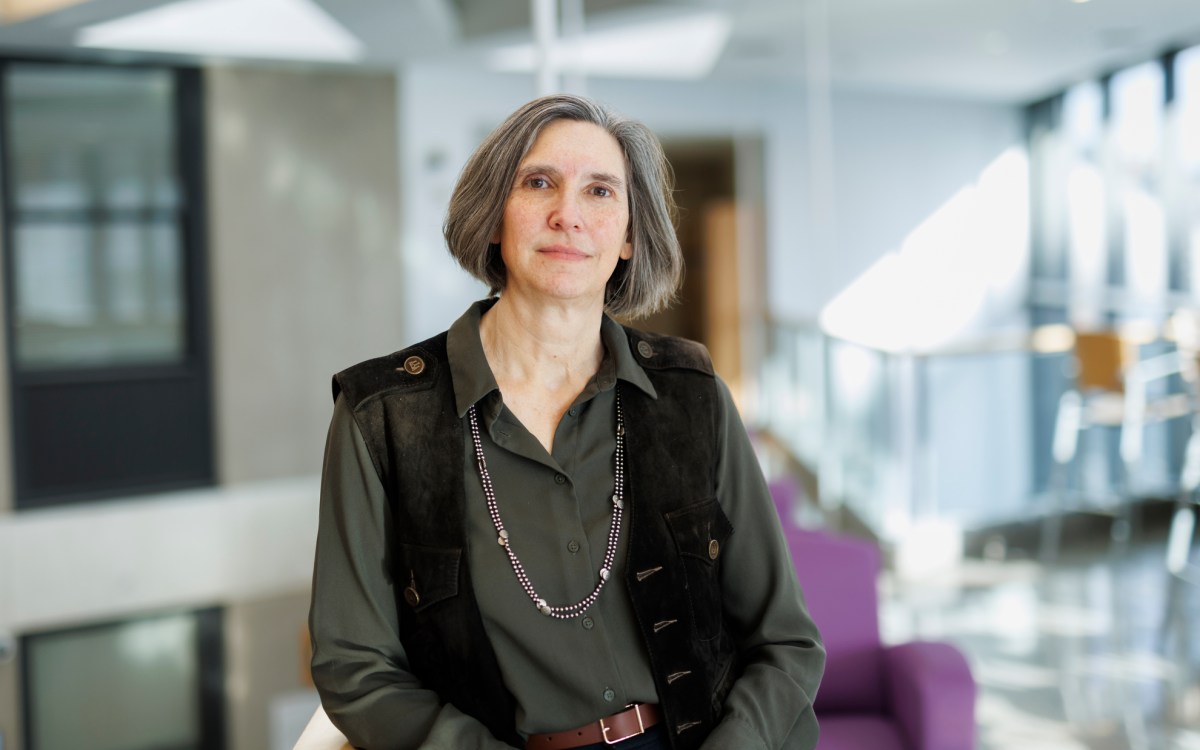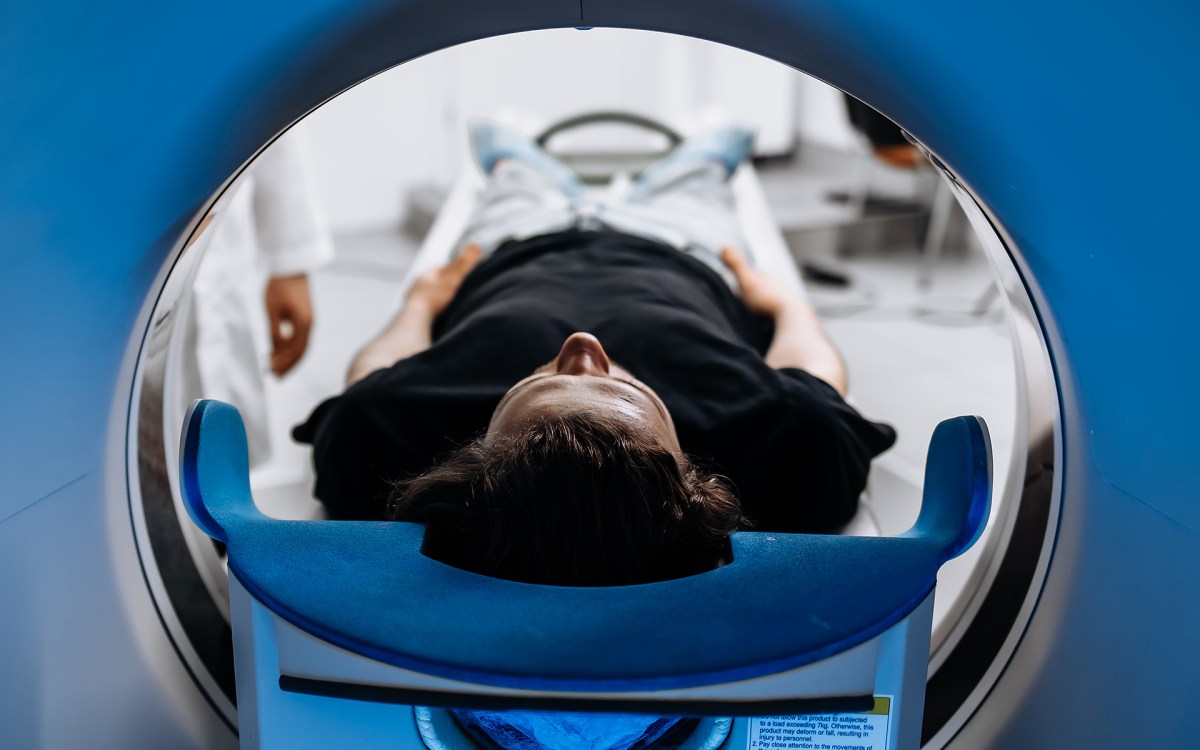Health
-

New AI tool predicts brain age, dementia risk, cancer survival
Unlike other AI models, BrainIAC needs limited data to ID key neurological health indicators

-

It’s time to get more comfortable with talking about dying
Palliative care physicians offer advice for end-of-life conversations between patients, loved ones
-

Turns out inherited eye diseases aren’t a sure thing
Study finds only fraction of those with mutated gene develop malady — a finding that could lead to better treatments (and could apply to other such illnesses)
-

How smoking divides America
Mapping the midlife effects of a lethal habit
-

Americans living longer after cancer diagnosis
Oncologist explains why rising survival rates only tell part of the story
-

Parental firearm injury linked to surge in children’s psychiatric diagnoses
Trauma/post-traumatic stress disorder accounts for most of the increase, according to study

-
Black lung redux
There are approximately 500,000 asphalt workers in the United States today who have significantly increased risk of lung, stomach, bladder, and nonmelanoma skin cancer – yet little is known about…
-
Adding years to your life
A research team did the first global study of the potential increase in life expectancy if 20 well-known risk factors could be eliminated or reduced to safer levels. These factors…
-
Identifying which tumors will spread
Researchers at Harvard Medical School have identified a pattern of gene activity that seems to predict whether cancer will return after it is first treated. The ominous pattern shows up…
-
Study shows U.S. health care paperwork cost $294.3 billion in 1999
Researchers at Harvard Medical School and the Canadian Institute for Health Information, Canada’s quasi-official health statistics agency, analyzed the administrative costs of health insurers, employers’ health benefit programs, hospitals, nursing…
-
Anti-inflammatory drugs may reduce Parkinson’s disease risk
In the first study to investigate the potential benefit in humans of the use of non-steroidal anti-inflammatory drugs (NSAIDs) in reducing the risk of Parkinson’s disease, Harvard School of Public…
-
Brain shows unconscious prejudices
A brain area involved with fear flashes more actively when white college students are exposed to subliminal views of black versus white faces. The students didn’t actually “see” the faces,…
-
Emotions change with direction
If someone looks directly at you with an angry expression, you usually assume that person is mad at you. If she or he looks away, you become unsure. The person…
-
Study finds neural stem cells are not rejected when transplanted
Most transplanted tissues are seen by the recipient as foreign and are attacked by the immune system, but certain parts of the body do not mount attacks against foreign tissue…
-
Researcher studies effects of terrorist attacks on office workers near WTC site
Since 1971, the National Institute for Occupational Safety and Health has conducted 1,200 investigations into indoor air. Last fall, the agency undertook an investigation unlike all the others. Aided by…
-
Imaging technique tracks tumor escape into lymph nodes
For doctors as well as patients, detecting metastases can be a notoriously burdensome affair. Often, the only way to see whether a patient’s lymph nodes are invaded by cancer cells…
-
Close adherence to traditional Mediterranean diet promotes longevity
The traditional Mediterranean diet features an abundance of vegetables, legumes, fruits, nuts and cereals and regular use of olive oil (monounsaturated fats), moderate amounts of fish and dairy products (mostly…
-
Pregnant women carrying boys eat more than those carrying girls
Researchers looked at the diets of 244 pregnant American women via a food frequency questionnaire during the second trimester. They found that women expecting a boy had an eight percent…
-
Eating less and living longer
Tantalizing evidence exists that cutting calories by 20 percent helps monkeys, who are close relatives, to live longer, healthier lives. And, in one nonscientific program, adults are reducing their caloric…
-
Hypnosis helps healing
“Hypnosis has been used in Western medicine for more than 150 years to treat everything from anxiety to pain, from easing the nausea of cancer chemotherapy to enhancing sports performance,”…
-
Leptin serves body as energy signal
Much leptin research in humans has focused on feasting rather than famine, but Christos Mantzoros’s team, led by Jean Chan, a Harvard Medical School clinical fellow in medicine, took a…
-
New ways found to fight anthrax
John Collier, Presley Professor of Microbiology and Molecular Genetics at Harvard Medical School, began tinkering with anthrax molecules in 1989. He looked into a powerful electron microscope and, for the…
-
Generous portions of TV make women fat
The first study to compare the effects of inactivity on obesity and diabetes concludes that being a couch potato significantly raises the risk of both diseases. “Our data provide strong…
-
Study sheds light on how the sun causes skin cancer
Scientists have discovered that the sun’s damaging ultraviolet (UV) rays target a series of biochemical signals inside the young skin cell, impairing the cell’s ability to control its proliferation. Lynda…
-
Study shows acrylamide in baked and fried foods does not increase risk of certain cancers in humans
Animal and laboratory studies in the past have indicated that acrylamide, a potentially carcinogenic substance, is found in elevated levels in certain foods, such as potato chips, French fries, cereals…
-
Minimally invasive treatment successfully destroys kidney tumors
A research team from Massachusetts General Hospital has described how a technique called radiofrequency ablation (RFA) destroyed all renal cell carcinoma (RCC) tumors less than 3 cm in size and…
-
CRP shown to predict heart disease among patients with metabolic syndrome
It is estimated that over 50 million people in the United States have at least three of the five medical problems that result in a diagnosis of metabolic syndrome. In…
-
Researchers find that sleep deprivation or excess in women may be associated with increased risk of coronary artery disease
Chronic sleep deprivation is common in today’s society. It is reported that a third of Americans sleep six or less hours per day. Previous research has shown that the effects…
-
Faking happiness for fun and profit
Laura Morgan Roberts of Harvard Business School and Stéphane Côté of the Rotman School of Management at the University of Toronto, Canada, studied 103 working college students. “We found that…
-
Animal study demonstrates carbon monoxide may help heart patients
Restenosis — reclogging of the heart’s arteries — is a vexing problem for patients who have undergone balloon angioplasty for the treatment of coronary heart disease. The condition apparently develops…
-
Combination therapy shows promise for delaying progression of Lou Gehrig’s disease
In a study, researchers reported that the combination of minocycline and creatine resulted in additive neuroprotection in the case of amyotrophic lateral sclerosis, also known as Lou Gehrig’s Disease. After…
-
Wide variation in physician career satisfaction seen across local markets
Physician career satisfaction levels are relatively consistent from year to year, and a clear majority of physicians nationally are satisfied with their careers. However, a survey showed significant variation in…
-
Medical texts and other fictions
In the 19th century, hysteria was considered one of the most common disorders afflicting women. Doctors advised parents to keep their daughters from riding horseback, eating vanilla, or reading novels,…
-
Study identifies risk factors for retained objects after surgery
A study found that errors involving leaving surgical sponges or instruments inside patients are more likely to happen during emergency procedures, or in operations where there is a sudden change…
-
Scientists identify hundreds of worm genes that regulate fat storage
Findings by Harvard researchers, published in the Jan. 16, 2003 issue of Nature, represent the first survey of an entire genome for all genes that regulate fat storage. The research…
-
Kidney disease genes tied to flow sensing
Polycystic kidney disease, or PKD, is the most common life-threatening genetic disease. It is caused by mutations in one of two genes. Though the genetic defect that causes PKD is…

